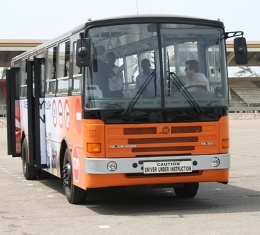The Metro Mass Transit Company has appealed to government to write-off its debts which have accrued as a result of the deferment of import duties on buses brought into the country.
Managing Director of MMT, John Awuku Dzuazah, warned any attempt to get the company honour its tax obligations to the state could see it go down.
“We will be making a case to the sector Minister so she can forward it to Cabinet and parliament,” he said.
MMT was established in 2003 by the government in collaboration with the Agricultural Development Bank (ADB), National Investment bank (NIB), Prudential Bank, SIC, SSNIT and GOIL.
It currently has a vehicle fleet of 1,128 that is projected to double by 2018.
The company is expected to take delivery of 230 new buses by the end of this year to support its operations.
Over the years several transport companies, such as OSA, set up by the state have collapsed due to revenue leakages and mismanagement.
STC, one of the surviving state-run transport companies, is not profitable and is now facing operational challenges - forcing its biggest shareholder, SSNIT, to lose interest in the business.
Mr. Dzuazah said government's intervention and support saved MMT from collapse about five years ago as the company's profitability waned. He said MMT's profitability hinges on its ability to effectively compete with private transport companies by charging commercial and competitive rates for its services.
“Without the intervention of government, this company would have collapsed about four years ago. If the support from government had stopped, this company would have collapsed.
“MMT is not allowed to charge commercial rates. The private operators charge higher than we do. We charge about 15- 20% lower than the private transport companies. “This gap between charging commercial rates and subsidized rates, somebody must bear that responsibility - and that's government. We also provide free bus rides for schoolchildren, and that's our social intervention programme.
“MMT will be profitable if we are allowed to charge commercial rates. But because it is a social programme, we are not allowed to charge commercial rates. We have to sometimes go to areas where the roads are not good. “We will continue to charge lower fares, but we want to run it as a commercial business,” he said.
In spite of its indebtedness to the state, the Metro Mass Transit (MMT) Company has set a revenue target of Ghc154million from its operations this year as it launches its five-year strategic plan and ICT-based fuel and vehicle tracking system in Accra.
Last year, the company's revenue reached GH¢ 123million, culminating in a net profit of Ghc9.2million.
According to the company's financial projections outlined in the strategic plan, it expects an 8.6% increase in net profit after tax margin for this year over the figure recorded in 2013.
The increase in the company's financial target hinges on the company's strategy to cut down on operational costs through reduced fleet downtime and fuel consumption, reduced loses on intra-city services, review fares and profitability of routes, and also trim overage employee retention schemes.
The MMTs strategic plan launched in Accra spans a five- year period from 2014-2018.
The strategic plan is anchored on seven basic objectives: improve the safety of passengers and staff; improve customer service; expand access to MMT services; establish a great workplace; increase profitability and attain financial sustainability; adopt environmentally-friendly practices and attain ISO certification 9001.
The company is hopeful that the development of its five- year strategic plan, which will incorporate various ICT platforms into its operations, will help to address most of the teething concerns of customers.
The Chairman of the Board of Directors of MMT, Osabarima Ansah Sasraku III, said development of the strategic plan is meant to provide a sense of direction in running the company as it strives to build an efficient bus system.
“These interventions, we believe, will transform MMT into a great workplace...The Board will provide the necessary leadership and direction, and will demand accountability and responsibility from management in the implementation of these programmes,” he said.
Osabarima Ansah Sasraku III called on the company's employees and shareholders to support implementation of the strategic plan, indicating that the free bus ride programme for schoolchildren in uniform will be extended to persons with disability.
General News of Monday, 19 May 2014
Source: B&FT
Metro Mass appeals for Ghc58m gov't bailout to avoid collapse

Entertainment











